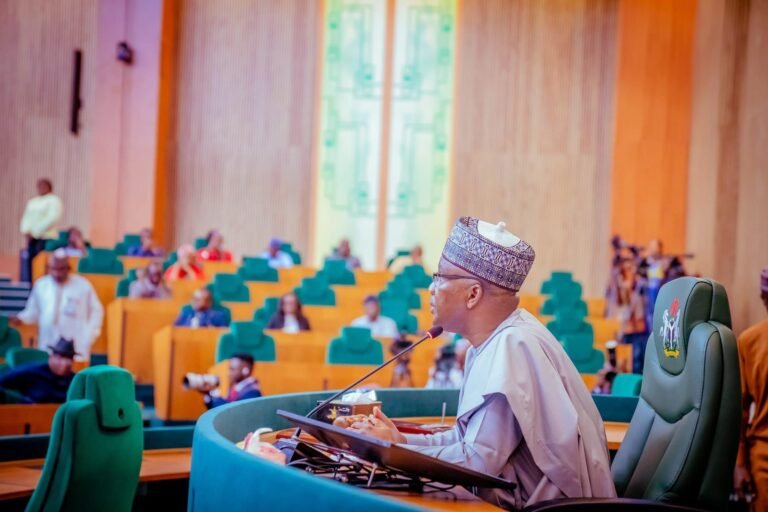The House of Representatives on Tuesday resolved to intervene in the recent industrial dispute between the Petroleum and Natural Gas Senior Staff Association of Nigeria (PENGASSAN) and the Dangote Refinery.
This followed a motion urging for the protection of strategic private investments from what lawmakers described as “adversarial unionism.”
The motion, titled “Need to protect strategic private investments from adversarial unionism,” was sponsored by Alhassan Doguwa (APC, Kano) and Abdussamad Dasuki (PDP, Sokoto).
It comes in the wake of the strike action by PENGASSAN that disrupted operations at the $20 billion Dangote Refinery, Africa’s largest single-train refinery over a labour dispute.
The dispute occurred while the lawmakers were on recess that lasted over two months.
Disruption at the Dangote Refinery
While presenting the motion, Mr Doguwa told the House that the strike had severe economic consequences, including a temporary halt in operations and a significant drop in crude production.
“The industrial action led to a disruption in Nigeria’s crude oil production, with a reported daily loss of approximately 200,000 barrels over a period of three days,” he said.
He noted that the industrial action worsened the already fragile fuel supply situation across the country, resulting in scarcity and long queues in several states.
The lawmaker emphasised that the Dangote Refinery was a private investment of “immense national importance,” with the potential to guarantee Nigeria’s energy security, reduce dependence on imported petroleum products, create thousands of jobs, and conserve foreign exchange.
Legal protection under NEPZA Act
Mr Doguwa also cited provisions of the Nigeria Export Processing Zones Authority (NEPZA) Act, particularly Section 18(5), which stipulates that employment within a Free Trade Zone shall be governed by the Authority’s rules and not subject to general labour laws.
“This means that labour disputes or strikes within such zones fall under NEPZA’s jurisdiction, not the broader national labour framework,” he said.
He expressed concern that actions by unions that disregard these legal protections “create a hostile investment environment that may discourage both local and foreign investors.”
“If private investments of strategic national importance are continually subjected to unlawful disruptions by adversarial unionism, Nigeria risks not only the failure of key economic assets but also the erosion of investor confidence necessary for national growth and development,” Mr Doguwa warned.
Debate
Supporting the motion, the co-sponsor Mr Dasuki stressed the need for Parliament to defend the sanctity of laws protecting investments in Free Trade Zones.
He described the Dangote Refinery as a landmark project and “the single largest private investment in Africa,” adding that Nigeria had long depended on imported refined products despite being a major crude producer.
Quoting Section 18(5) of the NEPZA Act, he reminded lawmakers that: “There shall be no strikes or lockouts for a period of 10 years following the commencement of operations within a zone, and any trade dispute arising within the zone shall be resolved only by the Authority.”
Mr Dasuki argued that by succumbing to union pressure, the government had acted contrary to the law.
“Any potential investor coming to Nigeria will look at our laws. Are we implementing our laws first? So we have to be seen to be implementing our own laws.
Objection over pending litigation
However, Cyril Hart (PDP, Rivers) cautioned that the House should not deliberate on the issue, claiming it was already before a court.
Mr Doguwa disagreed, insisting that the matter was not sub judice. “It’s not in court,” he maintained, while Mr Hart countered that the information was already public knowledge.
To resolve the disagreement, Deputy Speaker Benjamin Kalu, who presided over the plenary, advised that the House proceed with the motion “on the assumption that it is not in court,” pending any confirmation to the contrary.
House adopts motion
Following deliberations, the House adopted the motion and resolved that its leadership should take charge of mediating the dispute between PENGASSAN and the Dangote Refinery.
The council to handle the mediation will be headed by the Speaker of the House, Abbas Tajudeen, and will include other members of the House leadership.
Recent PENGASSAN developments
This motion comes amid a flurry of developments surrounding the dispute.
According to earlier reports by this newspaper, PENGASSAN recently suspended its nationwide strike after reaching an agreement with Dangote Group management and the federal government. The truce included assurances that dismissed workers would be reassigned within the Dangote Group without loss of pay.
However, the union warned that it would immediately resume the strike if any of the agreed terms were violated.
PENGASSAN President, Festus Osifo, said the association would “resume the strike without notice” if the commitments made by management and government were not honoured.
In a separate report, Dangote Refinery was said to have offered payment equivalent to five years of salaries to affected workers as part of efforts to restore industrial harmony.
The Federal Government, however, cautioned the union against further disruptions, insisting that “Nigeria is greater than PENGASSAN” and warned that such actions could harm the national economy.


